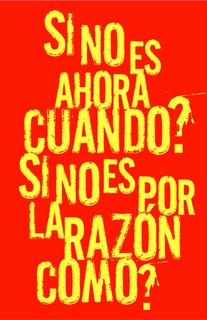
| Rights activist held in Oaxaca prison, alleges false arrest |
| By John Gibler/Special to The Herald Mexico El Universal Jueves 30 de noviembre de 2006 |
| Alberto Cilia Ocampo, a thin 21-year-old university student and regional chess champion from Mexico City, came to Oaxaca to document cases of forced disappearances and other human rights violations on Monday |
| Alberto Cilia Ocampo, a thin 21-year-old university student and regional chess champion from Mexico City, came to Oaxaca to document cases of forced disappearances and other human rights violations on Monday. Little did he know that within hours of his arrival, he would become the next case. At 4 p.m. Monday, hooded state police officers grabbed Cilia off the street together with Sarah Weldon, a 22-year-old French university student and Omar Rodríguez Camarena, a 28-year-old graduate student in history, and whisked them off in the back of a state police pickup truck. "I saw two guys wearing ski masks approach me. They grabbed my head, slapped me in the face, forced me down and put a hood over my head," Cilia said through the metal grating of the state penitentiary in Ixcotel. For the next 46 hours, Cilia and his two friends would live what they had come only to bear witness to: torture, interrogations, constant relocations between various state holding facilities, forced confessions, and ultimately trumped up charges. Cilia came to Oaxaca City on Monday as part of a commission sent by the Yaxkin Human Rights Center, founded by his father David Cilia Olmos in 1991. David Cilia said he began to receive calls the night of Saturday, Nov. 25, when Federal Preventative Police fought for hours in the streets with hundreds of members of the Oaxaca People´s Assembly (APPO). After the police detained and beat dozens of APPO protesters David Cilia´s colleagues in Oaxaca urged him to send a commission to help investigate and document human rights violations in the wake of the confrontation. "We met and deliberated on Sunday and decided to send a commission that night," David Cilia said. "Alberto arrived in Oaxaca City on Monday morning, gathered numerous testimonies and was on his way back." Cilia first learned of his son´s disappearance at 4:11 p.m. on Monday when another member of the Yaxkin delegation called him. That call remains registered in his cell phone. State Judge Guadalupe Lucas Figueroa said the two young men were charged with "sedition and aggravated acts of arson." Judge Lucas Figueroa said police detained the three "suspects" because "they were burning a motorcycle and chanting political slogans," he said. Although the judge insisted state ministerial police carried out the arrest, a court clerk provided a copy of the police report that said state preventive police had made the arrest. After 46 hours, Alberto Cilia and Rodríguez were finally able to speak with relatives for 30 minutes on Wednesday at the prison in Ixcotel. Weldon, however, is still incommunicado. Her lawyers said officials from the National Immigration Institute would not let them speak with or see Weldon, nor would they confirm her whereabouts. The lawyers are preparing an injunction to prevent Weldon´s deportation. In Ixcotel, both Alberto Cilia and Rodríguez were in good spirits and had few visible signs of torture on their faces. They testified that they had been hooded, slapped, stepped on, had a burning liquid poured on their backs and were threatened with electrocution. Throughout their beatings, police constantly threatened both men with death saying they would cut up their bodies and mail the parts off to various relatives, the men said. Cilia said that when the police first searched them they argued about whether or not to apprehend them, some officers saying that was no evidence. After a brief dispute, the police arrested them. The victims said police took them to four different holding facilities in 46 hours, repeatedly beating and threatening them. Cilia said state police forced them to sign false confessions, including that APPO leader Flavio Sosa had paid them 50 dollars to make Molotov cocktails. Both men plan to fight the charges and say they´ll file criminal charges against their captors as well as state authorities. |






